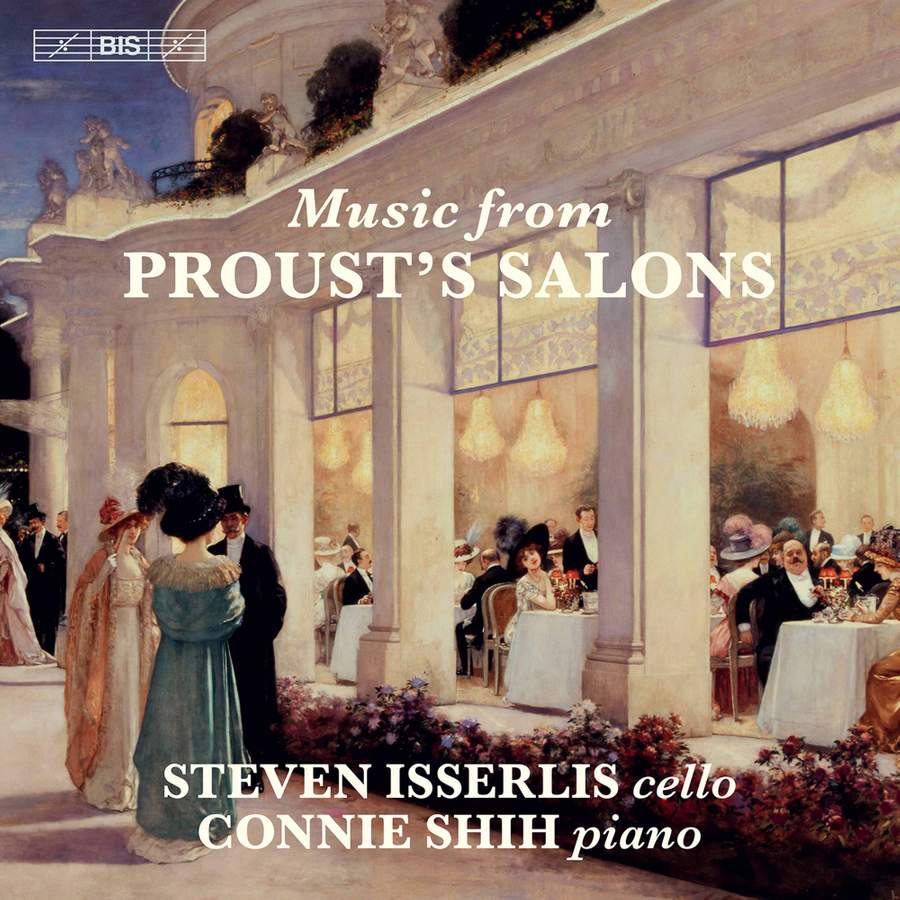Music From Proust's Salons
View record and artist detailsRecord and Artist Details
Genre:
Chamber
Label: BIS
Magazine Review Date: 04/2021
Media Format: Super Audio CD
Media Runtime: 83
Mastering:
DDD
Catalogue Number: BIS2522

Tracks:
| Composition | Artist Credit |
|---|---|
| Variations chantantes sur un air ancien |
Reynaldo Hahn, Composer
Connie Shih, Piano Steven Isserlis, Cello |
| Romance |
Gabriel Fauré, Composer
Connie Shih, Piano Steven Isserlis, Cello |
| Elégie |
Gabriel Fauré, Composer
Connie Shih, Piano Steven Isserlis, Cello |
| Sonata for Cello and Piano No. 1 |
Camille Saint-Saëns, Composer
Connie Shih, Piano Steven Isserlis, Cello |
| Cello Sonata, Movement: Lamento |
(Marie Eugène) Henri Duparc, Composer
Connie Shih, Piano Steven Isserlis, Cello |
| Récitatif et chant (After Holmès's "La vision de la reine") |
Steven Isserlis, Composer
Connie Shih, Piano Steven Isserlis, Cello |
| Sonata for Violin and Piano |
César Franck, Composer
Connie Shih, Piano Steven Isserlis, Cello |
Author: Tim Ashley
Steven Isserlis and Connie Shih take Proust as the starting point for their new themed album. Given that music itself constitutes a vast subject in À la recherche du temps perdu, it’s inevitable, perhaps, that a single disc can only really scratch the surface, and Isserlis and Shih, wisely, concentrate on works, some by composers Proust admired and knew, that might have been heard at one of the big Parisian salons that formed the inspiration for the novel’s great set pieces.
The main works, both of which Isserlis has recorded before, are Saint-Saëns’s C minor Cello Sonata and Jules Delsart’s arrangement of the Franck Sonata in A: the violin original has been suggested as a possible model for the fictional ‘Vinteuil Sonata’, discussion of which runs through the novel like a leitmotif. The shorter pieces include variations by Proust’s lover Reynaldo Hahn (the ‘air ancien’ is by Cavalli), some familiar Fauré, an excerpt from Duparc’s early Cello Sonata and an arrangement by Isserlis of extracts from the genre-bending La vision de la reine, a cantata-cum-cello-concerto by Augusta Holmès, first performed in 1895.
Everything is insightfully and engagingly done, as one might expect, and you sense a wonderful rapport throughout between the two players. The Franck is very high Romantic, grand in scope and gesture, with the Wagnerisms much to the fore, a fine performance, though I marginally prefer the refined tensions and greater restraint of Isserlis’s earlier version with Stephen Hough (Hyperion, 7/03). The Saint-Saëns is also grander than its predecessor (with Pascal Devoyon – RCA, 12/93), more incisively dramatic, the emotional range wider, the mixture of tenderness and wit in the slow movement elegantly and deftly captured. The recording scores highly over its rivals thanks to Isserlis and Shih’s decision to include the sonata’s original Allegro quasi presto finale alongside its more familiar replacement, written after sharp criticism from Saint-Saëns’s mother. She was right to object, as the original, discursive and at times self-consciously virtuoso, too obviously fractures the mood of the preceding movements. It’s good, though, to hear the earlier version nonetheless.
Duparc’s ‘Lamento’ and Hahn’s Variations are both ravishing discoveries: the former, in particular, is an exquisite, bittersweet song without words that contains the future composer of mélodies in embryo. Holmès’s Récitatif et chant, which Isserlis casts along the lines of the Franck Sonata’s ‘Recitativo-fantasia’ slow movement, seems less original, its debt to Franck’s instrumental writing overtly apparent. Fauré’s Élégie, meanwhile, gets a wonderful performance, grave and unsentimental, reaching tragic heights at its climax, and like the rest of the disc, beautifully played.
Discover the world's largest classical music catalogue with Presto Music.

Gramophone Digital Club
- Digital Edition
- Digital Archive
- Reviews Database
- Full website access
From £8.75 / month
Subscribe
Gramophone Full Club
- Print Edition
- Digital Edition
- Digital Archive
- Reviews Database
- Full website access
From £11.00 / month
Subscribe
If you are a library, university or other organisation that would be interested in an institutional subscription to Gramophone please click here for further information.




